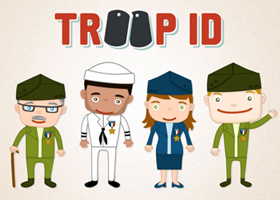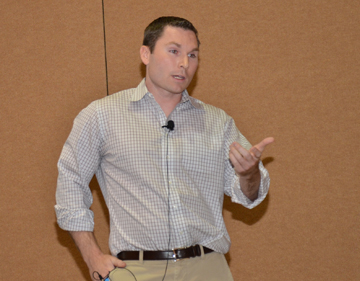 For entrepreneurs, business school presents a unique set of choices and opportunities that can drastically alter a founder’s chance of success — for better or worse.
For entrepreneurs, business school presents a unique set of choices and opportunities that can drastically alter a founder’s chance of success — for better or worse.
I founded Troop ID while I was an MBA candidate at Harvard Business School in February of 2010. And while today we employ 17 people and sign up nearly 1,000 new members daily, our path to success would have been much swifter had I leveraged the resources at my fingertips while in business school.
Here are 5 of my top lessons — many of them learned the hard way — for other MBAs considering entrepreneurship:
1. Research vesting carefully.
If you have a co-founder, then you will inevitably face a choice about how to split ownership of the company. Initially, this will seem simple: 50/50. But what happens when your co-founder – comparing his ramen noodle diet to the average starting salary of your MBA graduating class — decides to take a high-paying corporate job several months later and wants to remain an equal owner?
That happened to me, and I felt physically ill for almost two months until we sorted it out. Fortunately, smart investors won’t invest in companies until non-full time founders sell back their shares, and, ultimately, that reality allowed me to resolve the situation. But the confrontation cost me precious time and it ruined my personal relationship with a classmate I had once trusted. Looking back, I could have gone down the hall to see Noam Wasserman, a professor at Harvard who literally wrote the book on optimal ownership structures for Founding Teams. I still kick myself over that missed opportunity.
2. Find a mentor.
MBAs are uniquely positioned to find a mentor who is invested in their success. While I would steer clear of pure academic types, there are usually plenty of successful entrepreneurs on faculty. If you develop a personal relationship with a successful entrepreneur who trusts you and is passionate about your venture, then you will have gained the most valuable asset of all: someone who can open doors for you within their trusted network. Since most MBAs are first-time CEOs or founders, sophisticated angel investors will often require that a person they trust sit on the board of the company.
My mentor, Kelly Perdew, helped me navigate multiple pitfalls that could have killed our business; he kept our chins up when the breaks went the wrong way; and he kept our eye on the ball when they started to go right. Kelly provided introductions to most of our current angels and he walked me through the financing process. He’s the single best thing to happen to me and my company.
3. Understand the commitment.
An MBA provides a safety valve that many other entrepreneurs don’t enjoy — a terrible thing for entrepreneurs, because it means that you can waltz out of your company at any point in time and land in a safe, high-paying job. I had a full-time offer from a top management consulting firm that paralyzed me the first few months after I finished business school.
Until I declined that opportunity, I couldn’t make the tough decisions about the best geographic location for the company, I wasn’t fully bought into my own vision and, most importantly, I couldn’t hire talented people or ask them to leave their jobs because that would be unethical. Only when I fully committed to making my company successful did I feel free.
I waited far too long to make this decision and I allowed my Facebook feed – filled with my classmates’ vacations and ski trips – to influence my thinking. After declining the job offer, the next year was even worse. I was lonely. My credit cards maxed out. But I never quit because I was passionate about the problem that I was solving.
4. Focus on your product, relentlessly.
Before we even had a product, I had built a sharp-looking Excel business model that projected a meteoric rise to success. I cringe now when I write about it because, while I understood financial modeling, I understood virtually nothing about building a company. Because I had business training, I thought that my job was to go out and build a sales and marketing plan and to develop relationships with other businesses. I pursued these activities at the expense of the product — the core of the business.
After a few months and a harsh (but much-needed) conversation with one of our seed investors, I stopped doing everything else until we nailed our product and validated our assumptions with small cohorts of customers.
Today, focusing on product first is a personal mantra. It’s also incredibly rewarding because it allows for a level of creativity and self-actualization absent in most other functions. MBAs are well-suited to leverage their business training to provide analytical rigor to validate customer assumptions based upon customer behavior with product features.
In the meantime, I’ve learned not to waste money selling and marketing a product that doesn’t solve a real problem.
5. Pitch everyone.
The biggest advantage of being an MBA is that you have access to virtually everyone you need to poke holes in your idea: faculty, lawyers, angel investors, VCs, corporate executives, classmates, and potential customers. Pitch everyone you meet while you are in business school, and soak in the feedback. After a few weeks, you’ll notice that the critiques you receive are clustered around perceived weak points in your business model or flaws with your product idea.
If you can gather the data to answer each one of those critiques, then people will start writing checks to you — and they will leave their jobs to come work for you.
America needs more talented leaders to choose entrepreneurship. Our best and brightest have the most impact when they build new products that solve meaningful problems and give people jobs. We don’t need more bankers and consultants. If you decide to go this route, I wish you the best of luck!
Blake Hall is the Founder and CEO of Troop ID, a digital authentication engine capable of verifying military affiliation online. An Airborne-Ranger qualified officer, Blake led a battalion reconnaissance platoon in Iraq for fifteen months during 2006 – 2007. He has written for The Washington Post, Foreign Policy, The Huffington Post and Vanderbilt Magazine. Thanks to The Economist, he is also the first Google result for the phrase “muscly entrepreneur.”
The Young Entrepreneur Council (YEC) is an invite-only organization comprised of the world’s most promising young entrepreneurs. In partnership with Citi, the YEC recently launched #StartupLab, a free virtual mentorship program that helps millions of entrepreneurs start and grow businesses via live video chats, an expert content library and email lessons.



